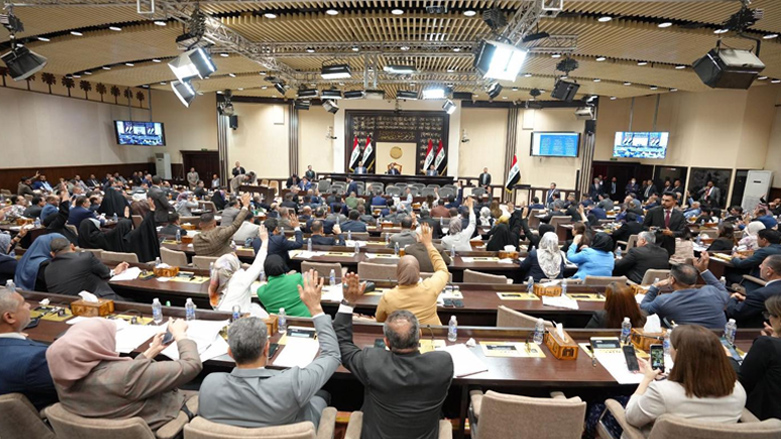Iraq passes controversial, three-year budget bill

ERBIL (Kurdistan 24) – Iraqi lawmakers early Monday passed the country’s controversial budget bill for three fiscal years until 2025 following several delays, the legislative house announced.
The passage came after several delays over concerns raised by the Kurdish representatives, particularly over the last-minute changes introduced by the parliament’s finance committee, contradicting the previous agreements made between Erbil and Baghdad over the management of oil and gas, according to Kurdish officials and lawmakers.
Hailed as one of the country’s biggest budgets, the state expenditures set at 198.91 trillion Iraqi dinars ($153 billion) with a deficit of more than 64 trillion dinars (over $48 billion).
The Kurdistan Region’s share in the federal budget is set at 12.67 percent, amounting to more than $12 billion annually.
The budget allocates the majority of its funds to cover the operational costs, amounting to nearly $102.5 billion while the investment allocation is only $37.9 billion.
The rest of the funds will go to cover the country’s debt obligations.
A barrel of oil is set at an assumed price of $70, with an average daily production of 3.5 million barrels of oil, including the Kurdistan Region’s 400,000 barrels.
The estimated figures are for the years 2023, 2024, and 2025. The parliament will be able to vote on any amendments that will be made in the next years by the government.
Kurdish dismay
The bill’s passage delay was caused by severe opposition from the parliamentary factions, particularly over the amendments made by the finance committee regarding Kurdish oil and gas management.
The Kurdistan Democratic Party (KDP) has said it had “foiled” attempts intended to undermine the Kurdish region’s standing and its constitutional status.
Hoping for the budget to be implemented in a “goodwill manner”, KDP President Masoud Barzani expressed his dismay at those parties that “did not honor their signatures and vows” and breached the agreements previously reached between Erbil and Baghdad.
The leader described those entities as “chauvinistic and populist” whose attempts to undermine the Region’s constitutional entity “failed”.
As a petrostate, Iraq’s main source of revenue, accounting for 95 percent, comes from oil sales. According to the latest figures from the Central Bank of Iraq, the country’s foreign reserves last month set at $111 billion while its gold reserves increased to 132.74 tons, ranking 30 among those nations that hold gold reserves.
Prime Minister Masrour Barzani on Sunday said that his government would not give up the Region’s constitutional rights.
The management of oil and gas has been among the thorny issues between Erbil and Baghdad for over a decade, leading to the suspension of the Region’s share in previous federal budgets.
Prime Ministers Barzani and Mohammad Shia’ Al-Sudani on April 4 struck a deal to resume Kurdistan Region’s halted oil export to Turkey after the flow was suspended at Baghdad’s request as the International Court of Arbitration in Paris ruled in Iraq’s favor.
Iraq’s state oil marketing company – SOMO- will sell the Region’s 4,500 barrels of oil, whose revenues are set to be deposited at a bank account that can be audited by Iraqi officials along with federal and regional ministries of natural resources, per the budget law. An international auditing company will similarly be involved in the process.
Article 14 (7), which was passed in the parliament, drew severe criticism from the KDP, the biggest component of the KRG. The provision allows Baghdad to provide financial entitlements to regional provinces in case the regional government fails to distribute the budget equitably.
The leading party dubbed the passage as “unconstitutional” and an attempt to “divide” Kurdistan Region.
